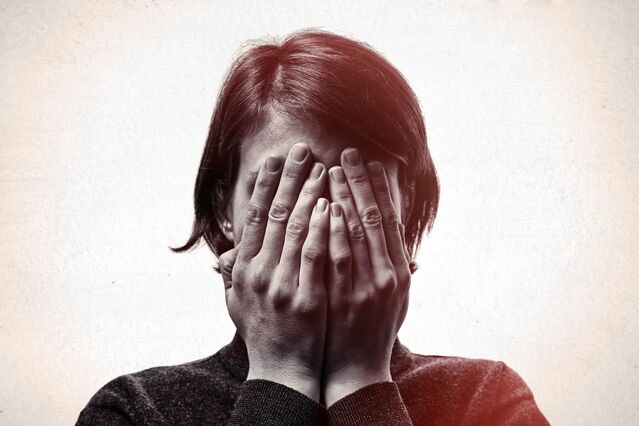Embarrassment
How Shame Affects Your Passion for Life and Love
Shame is key to the loss of passion and intimacy. What helps is an intervention.
Posted April 22, 2021 Reviewed by Jessica Schrader
Key points
- Shame is often key to the subjugation of passion in people’s lives.
- “Unshaming” yourself by applying a counter-message may need to be done repeatedly.
- According to Karen Hanrahan, reassurance from external validation is also important for self-esteem.

“The suppression of sexuality leads to a general inhibition of desire and curiosity, a restriction on wanting and knowing that spreads throughout your life.” —Sigmund Freud
Like many people, Karen Hanrahan has had a tempestuous lifelong relationship with her body, a relentlessly self-defeating attitude that experts call dysmorphia, an unhealthy preoccupation with her body’s perceived flaws, which has tended to generalize to her perceptions about herself.
“When I look in the mirror, I find everything wrong,” says Hanrahan, a wellness entrepreneur who describes herself as “a curvy hirsute (hairy) woman of size.” And this, she says, has been a problem for, among other things, her love life. “My experience with intimacy has been that it was great as long as the covers were on and the lights were off.”
What this reflects is something that’s key to the subjugation of passion in people’s lives, and the withering of intimacy between them: shame. Not healthy shame, aka conscience, which tells us when we’re doing something wrong, but toxic shame, which tells us our very being is wrong, that who we are at the core is fundamentally flawed, which turns us away from our enthusiasms and instincts and cripples our ability to affirm ourselves. In relationships, it often shows up as a lack of intimacy, because you don’t want others to get close enough to see those flaws.
But we feel it whether we’re being shamed for our bodies or our beliefs, our curiosities, or our creativity. And we express it in depression, addiction, perfectionism, people-pleasing, and excessive self-consciousness that makes us terrified of making a mistake, embarrassing ourselves in public, making love with the lights on and the covers off, or even looking at ourselves naked in a full-length mirror. And it remains long after our shamers have passed from the scene, whether those were parents, teachers, or the damnations of a puritanical religious upbringing.
The most rudimentary step in undoing this spell, in unshaming yourself, is conducting an intervention. Not once, but repeatedly. That is, catching yourself in the act of self-shaming and applying a compensating reaction, a counter-message. Let’s say you introduce a new sexual position or fantasy into your love life, and your partner doesn’t exactly share your enthusiasm, maybe even thinks it’s a little weird. Naturally, you’re going to feel some shame. So you might tell yourself, “There’s nothing to be ashamed of. So it fell flat. I know he/she still loves me, and I know my suggestion is something I enjoy, and I’m proud of myself for taking a risk. Maybe next time he/she will be more open.”
But changing your tune is a numbers game. You may have to sing yourself a different song a dozen or a hundred times before you begin to believe it, before it begins to sink in. After all, there are easily that many messages to out-shout, and you’re not going to overrule them just by clicking your heels together.
At 50 years old, Karen Hanrahan began that intervention with what a friend calls her “social experiment,” a creative, confrontational, even defiant attempt to come to terms with her sense of self and her sense of shame, and look at her body-image issue in a most literal way—through the eye of a camera.
What inspired it was a very revealing conversation she’d had a few years before with a male friend who had what she calls “adoring eyes.” Whenever he complimented her looks, she responded the same way. “Yeah yeah yeah."
“I just wasn’t there. I just didn’t feel attractive. Dating was horrendous. Meeting people was horrendous. My personal life was horrendous. But he would look at me and say, ‘I wish you could see what I see.’ So I decided to find out.”
Thus began Anonymously Nude, “a journey and a journal” in which she chronicles the reexamination of her own body in photographs that she takes of herself and posts on a blog, which has received several hundred thousand hits in seven years, 200-400 a day, from people who, along with Karen, are bearing witness to her “self-discovering.”
Men are the majority of her respondents, of course, but they’re not the only beneficiaries of this photographic experiment. Studies have shown that when women are exposed to images of thin women, their body satisfaction decreases. but it increases when they’re exposed to images of larger women. “I consider my blog a gift to others. It’s also just simply very liberating and exhilarating to me, and fun. And it’s strengthened my internal idea of myself; not just looking at myself but really seeing myself. And what the camera sees is very different than what my eye sees. It’s very affirming and beautiful. The camera’s eye is much more confident than mine.”
As the poet and painter William Blake once said, “We have no body distinct from our soul, for that called Body is a portion of soul discerned by the five senses, which are the chief inlets of soul in this age.” Karen’s challenge: to see her soul in the form of her body, and to use her senses to know it.
Sensuousness, in fact, has been one of the great surprises to come out of the project. The sensual and pleasurable experiences she’s had while photographing herself in different fabrics, laces, beads, feathers, varieties of light and shadow, running water, etc. have heightened her appreciation of her body. “That was a huge surprise to me. I was actually getting off on it, which is certainly not how I started.
“I’d never even looked at certain parts of my body before I began photographing it. When I first spread my legs and took photos of that part of me, and uploaded them onto my computer screen, I just about died. I just screamed and hid them in my files, because it just didn’t look anything like I thought it did, and certainly compared to the Playboy magazines I saw while I was babysitting in fifth grade. So in addition to being a full-figured woman, and also very hairy, my private parts didn’t look at all like what they promote.”
In blogging about one of the first photos she posted, of that part of her as seen through a fishnet stocking, she wrote, “I am embarrassed. This shows a part of me that I despise.” Of another photo, she says: “It makes me want to crawl under a rock.” Of yet another: “Did I really just post this image on the internet?"
“I just didn’t have a relatedness to these parts of my body—anything below the waist.”
Yet soon she began finding the photos—or more to the point, her body, as seen through the camera lens—“alluring.” What the camera sees, she said, is “a level of beauty, and vulnerability, expression, line, shape, form that’s very attractive. In a sense, the photos cherish my body, and to cherish is what I’m striving for in my life. I absolutely cannot believe that these images are me, and that I can now see how my roundness is actually inviting. Some of the images even take my breath away. How many people even know what they look like from behind? I had no idea. And now I think that’s my best side. I’ve certainly become far more intimate with my body than most people are with theirs, even when they love their body.”
Along with her nudity, she’s found, her sexuality has also become bolder and more expressive. At first, some of her photos were deliberately blurry because she was so shy about it, but soon she began describing herself and her photos as “sassy, playful, confident and sexy. My self-esteem and personal confidence are completely altered. And the feedback I sometimes get is, ‘This is stunning,’ or ‘I like the way this looks,’ or ‘I want you.’
“If nobody had said anything, I probably wouldn’t have continued with the blog. But they did, and I realized I really like to be looked at. I didn’t know that about myself. And I don’t think I ever noticed if men were looking at me. I was just oblivious to myself. And this is why I say, ‘Where have I been all my life?’
“I realized that I really need reassurance. The best way to get past despising myself was just to put myself out there and hear more of the good. Self-esteem isn’t strictly an inside job, it turns out. It can get a serious boost from external validation, too.”
It’s unfortunate that external validation, certainly when compared to internal validation, is often looked down upon as inferior. When we were children, it was the only kind of validation there was. We couldn’t give it to ourselves. It had to come from our parents or caretakers. But the kind of validation we got from our parents, assuming we got it, was radically different than the kind we get later in life from peers, teachers, colleagues, counselors, lovers, friends, and blog readers—even when it sounds identical. This is because of when we got it—when our self-esteems were being set-designed.
External validation is simply more potent at that stage of the game, and beyond adolescence it’s difficult to work up the escape velocity needed to free yourself from a self-esteem damaged in childhood. Not impossible, just hard. It’s taken Karen several years of concerted effort, thousands of photographs, and close to a thousand blog posts, to begin turning it around.
Last summer, Karen experienced something like a graduation ceremony vis-a-vis her social experiment. She had let her hair grow out in full—“full hairy legs, hair between my breasts, hairy armpits, the whole thing, long and dark and black”—and she was attending a business networking event. It was a particularly warm day, she was wearing a sleeveless blouse, and when she took off her jacket a man approached her and said, “You need to put your jacket on and be a professional.”
And Karen, looking him square in the eye, raised her arms slowly, running her fingers languidly through her hair, baring her armpits, and said, “Really?” The man stormed off, and a moment later three strangers, two women and a man, came up to her and said, “You go!”
“I never would have had the courage to do that before. And I felt exhilarated. Brazen even. Look at me, I’m hairy and proud proud proud. When I told my daughter about it, she said, ‘Wow mom, how Euro.’”
For more about Passion!, visit www.gregglevoy.com.




